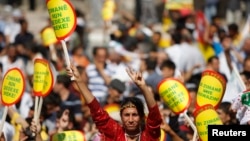In a packed auditorium, a performance of a historical epic Kurdish poem, its tragedy akin to Shakespeare's "Romeo and Juliet," is taking place.
It was adapted for theater and produced by Kurdish poet Kawa Nemir. Nemir points to his traumatic childhood in Turkey as the driving factor to fight to keep the Kurdish language alive.
"With the beginning of school I was harshly assimilated," he said. "They were telling us, 'You are Kurds, but you are beasts.' I remember this. And also, 'You are not a nation. You are not human. You don't have any language. You don't have any literature.' When I started to be more political, I had to do something."
During the rule of the country’s generals throughout much of the 1980s, Kurds officially did not exist; they were referred to as “mountain Turks." Their language was banned in public until the 1990s, but slowly restrictions were eased.
Despite numerous brushes with the law, Kawa embarked on his prolific career of poetry and translation. It was a career that he admits probably saved his life. Unlike most of his friends, Kawa chose not to join the PKK, the Kurdish rebel group that has been fighting the Turkish state for minority rights for four decades.
'I have to write'
"I had some really intimate friends and I lost them," he said. "They were really my comrades, my friends. And in university I was one of the rare ones who chose to be a writer and did not die. If I did not write, I would have gone to the PKK, because we were all ready as a generation. I stayed here and said, 'Yeah, I have to write.' Language itself is a strong means for a whole, a nation, because it's combining our nation."
But his fight for the Kurdish language and culture also brought him into conflict with PKK rebels.
"They were really not aware of the role of the language in forming and combining society," he said. "They were so late. The PKK leader, Mr. Abdullah Ocalan, in 1995 said if we achieve this revolution, maybe for 50 more years we will be speaking in Turkish, not Kurdish. But right now, for the last eight or nine years, they are so active. We have a lingual movement for education."
Along with a political awareness among many Kurds, there is also now a growing cultural awareness.
At the end of one of Kawa’s productions, there is appreciation and hope among many in the audience.
"We have waited so long for such a theater in our own language," one audience member said. "It's an historical and beautiful moment for us. We can now see and hear our literature, which has been denied for so long."
A sense of accomplishment
Kawa has so far written and translated 89 books into Kurdish. He has even produced Shakespeare’s "Hamlet" and taken it on tour to Iraqi Kurdistan and to Kurds living across Europe. After years of struggle, Kawa believes he is now seeing the fruits of his work.
"There were some students from universities, they were reciting my translations of Shakespeare sonnets," he said. "It made me really very happy. I saw that demand is getting more and more every year. What they took from us was our belief, our national belief. Right now, Kurds are not doubting about being a nation. They believe we are nation."
There is a tentative peace process between the government and the PKK. But Kawa believes whatever the outcome, there is an irreversible cultural and political assertiveness among Kurds in Turkey and across the region.




